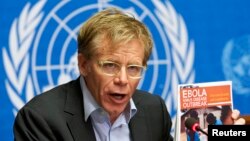A senior official of the World Health Organization says halting the Ebola epidemic in West Africa by the end of this year is a realistic and appropriate goal.
In the past four weeks, the World Health Organization reports cases of Ebola have dropped from 35 a week to two this week, one each in Sierra Leone and Guinea. But it cautions these numbers are likely to increase, as flare-ups of the disease are not uncommon.
The U.N. agency says the response to the epidemic has gotten much better. During the past few months, it says health workers have got a better grip on how to deal with chains of transmission.
WHO Assistant Director-General Bruce Aylward explains health workers have become much better in identifying people who are infected with the Ebola virus and in tracing all those who have come in contact with the patient. He says the number of cases of Ebola has gone down because fewer people who potentially could spread the disease are being missed. But he cautions against complacency, noting substantial risks from Ebola remain.
“The biggest risk now is irrational exuberance, to quote a famous economist or unrealistic expectations or people thinking, 'Oh great, it has gone from 30 to 25 to seven to two. It will go to zero, to one and zero.’ It will not," he said. "What will happen is in some of the areas where we still have a transmission chain, we may have an unsafe burial again. We may have a missing contact who goes and infects a new area and we will get a flare.”
Aylward is enthusiastic about the development of what appears to be a safe and effective vaccine against Ebola. He tells VOA the vaccine can play an important role in controlling and containing Ebola, but he says people have to temper their expectations.
“Sometimes, people run away with the idea that it is a game changer. It is not a changer as much as it is an enhancer," he said. "The game is still about case finding, contact tracing, rapid isolation, and safe burials. That is how you stop Ebola, certainly in the current period. Now what the vaccine may do, may help to reduce the number of contacts, or contacts of contacts who get exposed to it, help protect health workers potentially. So, it should help make us safer.”
Aylward notes Guinea, Sierra Leone, and Liberia have reduced the case numbers and fatalities from Ebola to practically zero without the help of a vaccine.




